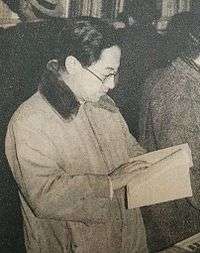Saburō Matsukata

Saburō Matsukata (松方三郎) (August 1, 1899 – September 15, 1973) of Japan, a journalist, businessman and mountaineer, served on the World Scout Committee of the World Organization of the Scout Movement and was the sixth President of the Boy Scouts of Japan, contributing to the success of the 13th World Scout Jamboree held August 2 to 10, 1971 on the western side of Mount Fuji.
Matsukata was son of the early Meiji Period Finance Minister and genrō, Matsukata Masayoshi.
In 1972, Matsukata was awarded the Bronze Wolf, the only distinction of the World Organization of the Scout Movement, awarded by the World Scout Committee for exceptional services to world Scouting.[1] In 1973 he posthumously received the highest distinction of the Scout Association of Japan, the Golden Pheasant Award.[2]
An experienced mountaineer and lifelong alpinist, Matsukata led Japan's 39-person expedition to Mount Everest in 1970.[3]
References
- ↑ https://www.scout.org/BronzeWolfAward/list complete list
- ↑ reinanzaka-sc.o.oo7.jp/kiroku/documents/20140523-3-kiji-list.pdf
- ↑ Haru Matsukata Reischauer, "Samurai and Silk: A Japanese and American Heritage", Harvard University Press, 1986, page 317
- Dr. László Nagy, 250 Million Scouts, The World Scout Foundation and Dartnell Publishers, 1985, complete list through 1981
See also
External links
| Preceded by Hidesaburo Kurushima |
Chief Scout of the Scout Association of Japan 1971-1973 |
Succeeded by Akira Watanabe |